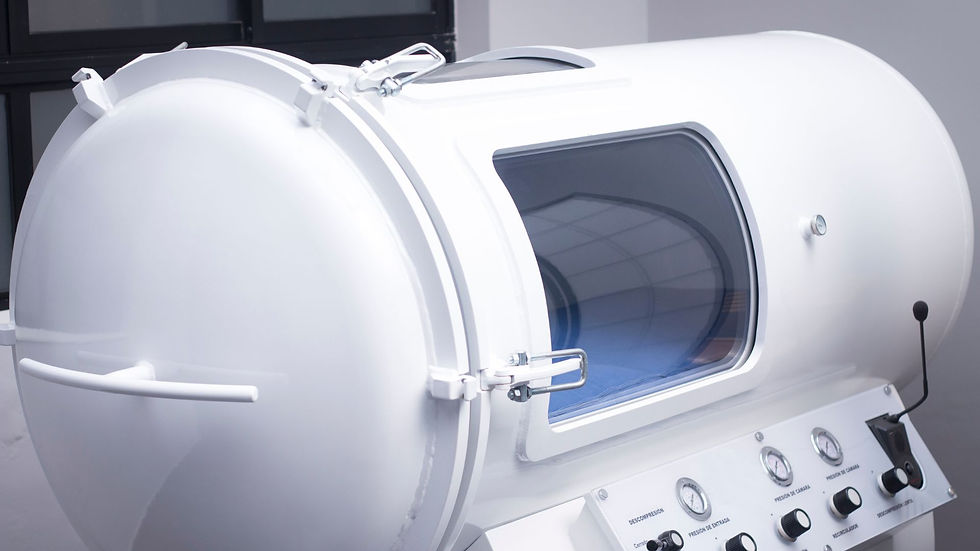Hyperbaric Oxygen Therapy (HBOT): Wound Healing, Cancer Treatment, & Beyond
- Kelly McClintock, MA, LICDC-CS, MCAP

- Feb 27, 2025
- 2 min read
Updated: Feb 28, 2025

What is Hyperbaric Oxygen Therapy?
HBOT involves breathing pure oxygen in a pressurized chamber/tube or room, typically at 1.5 to 3 times the normal atmospheric pressure. This process increases the amount of oxygen your blood can carry, promoting healing and fighting infections. Think of it as turbocharging your body's natural healing processes.
Ways to Increase Oxygenation Besides a Chamber
Mild Hyperbaric Oxygen Therapy (mHBOT) – Although these at-home systems operate at lower pressures than medical-grade chambers (HBOT), many users report significant benefits.
EWOT (Exercise with Oxygen Therapy) – Breathing high-concentration oxygen through a portable unit (via a mask) while exercising helps to boost circulation and oxygen levels.
Ozone Therapy – Some alternative health practitioners use ozone therapy to enhance oxygenation in the body.
Deep Breathing Techniques – Practicing breathwork, such as the Wim Hof Method, can naturally improve oxygen intake.
Benefits of HBOT
While HBOT is FDA-approved for specific conditions, some health enthusiasts explore its potential for other uses. Here are some benefits:
Wound Healing – HBOT can promote wound healing by stimulating the growth of new blood vessels and increasing collagen production.
Improved Brain Function – Some studies suggest that HBOT may improve cognitive function, memory, and neuroplasticity, making it a potential tool for those recovering from brain injuries or looking to optimize performance.
Enhanced Athletic Recovery – Many athletes use HBOT to reduce muscle fatigue, inflammation, and enhance endurance.
Cancer Prevention and Treatment Support – Some experts have discussed HBOT’s potential role in cancer therapy. Cancer cells thrive in low-oxygen environments, and increasing oxygen levels may help slow tumor growth and improve the effectiveness of conventional treatments. Research is ongoing, but many patients are exploring HBOT as an adjunctive therapy alongside chemotherapy and radiation.
Who Should Consider HBOT?
HBOT is FDA-approved for treating conditions such as:
Decompression sickness (for all the deep-sea divers out there)
Serious infections
Wounds that won’t heal due to diabetes or radiation injury
Carbon monoxide poisoning (for those unfortunate gas-leak situations)
Off-label uses:
Cognitive decline, including Alzheimer’s and dementia
Autoimmune conditions
Chronic fatigue and fibromyalgia
Autism
Cancer support (in conjunction with traditional treatments)
*If you're considering HBOT for any health benefits, it’s essential to consult with a healthcare provider to determine if it’s appropriate for you.
Potential Risks
Potential side effects include:
Ear and Sinus Pain – Changes in pressure can cause discomfort, similar to what happens during a flight.
Temporary Vision Changes – Some people experience nearsightedness, which usually resolves after treatment.
Oxygen Toxicity – In rare cases, breathing high concentrations of oxygen can lead to oxygen poisoning, causing lung issues or seizures
Where to Get HBOT
HBOT is offered at
Hospitals
Specialized clinics
Holistic Wellness centers
Alternative Clinics
If you’re looking for a facility, consider:
Checking accreditation and credentials of the clinic
Ensuring treatments are supervised by a qualified medical professional
Reading reviews and testimonials from other patients
That’s a Wrap
Many athletes, biohackers, and cancer patients swear by Oxygen Therapy.
Ever tried HBOT? Would you? Let us know in the comments.




Comments